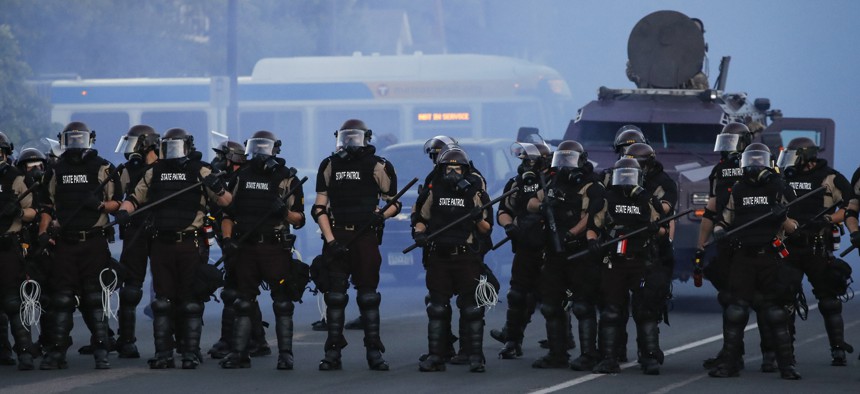George Floyd Case Renews Calls to Limit Legal Immunity for Police

Police in riot gear prepare to advance on protesters, Saturday, May 30, 2020, in Minneapolis. Protests continued following the death of George Floyd, who died after being restrained by Minneapolis police officers on Memorial Day. AP Photo/John Minchillo
The U.S. Supreme Court is considering whether or not to take up a series of cases that challenge the legal doctrine of qualified immunity, which has been used to shield officers from civil liability over their actions.
For several years, the libertarian Cato Institute has sought reform of a wonkish legal doctrine, qualified immunity, that has been used to shield police officers from being sued over official action taken on the job.
But it wasn’t until demonstrations against police misconduct engulfed cities across the United States this weekend that Cato policy analyst Jay Schweikert said he saw protest signs calling for qualified immunity to be abolished. Growing public focus on the issue comes as the U.S. Supreme Court weighs whether to hear several cases that challenge officials’ use of immunity and as at least two federal lawmakers have introduced legislation to curtail it.
“The turmoil we are seeing is people acknowledging that law enforcement do not face accountability when they step out of line,” Schweikert said. “I think we are really at a critical crossroads here.”
The Supreme Court developed the legal doctrine through a series of decisions dating back to 1967 that were meant to protect government employees from frivolous litigation. But qualified immunity defenses have largely been used to prevent people from suing police officers who use excessive force. The concept is that people who sue police must show that the officer broke a “clearly established” law, which has turned into a difficult standard in many cases.
A Reuters investigation this year found that since 2005, appellate courts “have shown an increasing tendency to grant immunity in excessive force cases—rulings that the district courts below them must follow.”
Federal courts have granted immunity to law enforcement officers in cases that include:
· A deputy sheriff who shot a 10-year-old boy as he was lying on the ground while the deputy was aiming for a pet dog in the yard.
· Two canine officers who released a dog to apprehend a burglary suspect after the suspect claims he had already surrendered to police.
· Officers who caused extreme damage to a women’s home after firing tear gas canisters inside while searching for her wanted ex-boyfriend, who was not ultimately found at the residence.
Renewed scrutiny of the legal principle comes amid nationwide protests over the death of George Floyd, a 46-year-old black man, who died after a white police officer pinned the man’s neck to the ground using his knee.
One of the attorneys representing Floyd’s family said this week that the qualified immunity standard is too high to be able to hold law enforcement officers accountable for even egregious actions. Attorney Lee Merritt called on Congress to roll back qualified immunity standards “to address lack of accountability and excessive force in American policing.”
“We need legislation that specifically goes after qualified immunity and the additional protections offered to law enforcement officers,” he said during a press conference this weekend. “This would have to be a bill that goes after the heart of two issues, the first is accountability for law enforcement officers and, as redundant as it may seem, we need better-trained officers.”
Conservatives and liberals alike have called for reforms.
Two members of Congress, Libertarian Rep. Justin Amash, and Democratic Sen. Cory Booker, each announced plans this week to introduce legislation that would curtail use of qualified immunity.
Police groups argue giving officers qualified immunity protects them as they are forced to make quick decisions in difficult situations. Mike Ranalli, the former president of the New York State Association of Chiefs of Police, told Law360 that without it officers will be held to an unfair standard.
“You cannot hold officers and, through the officers, their municipalities liable for violating a rule they could not know,” he said.
Doing away with qualified immunity would allow people to more frequently sue police, but it wouldn’t necessarily make it easy to win a case or result in a tidal wave of litigation targeting law enforcement, said Joanna Schwartz, a law professor at the University of California, Los Angeles who has written extensively on the issue.
“Qualified immunity results in a dismissal of a relatively small number of cases,” she said. “The vast majority of cases that fail, fail for reasons other than qualified immunity.”
It would still be difficult to bring cases that meet constitutional standards or to convince juries that are still often sympathetic to law enforcement, she said.
In addition to giving victims of illegal or unconstitutional police action a way to seek damages, qualified immunity reform could also help to weed out bad officers, Schweikert said.
“It will change the general culture of law enforcement,” he said.
Andrea Noble is a staff correspondent with Route Fifty.
NEXT STORY: Protesters Demand Defunding and Demilitarization of Police





